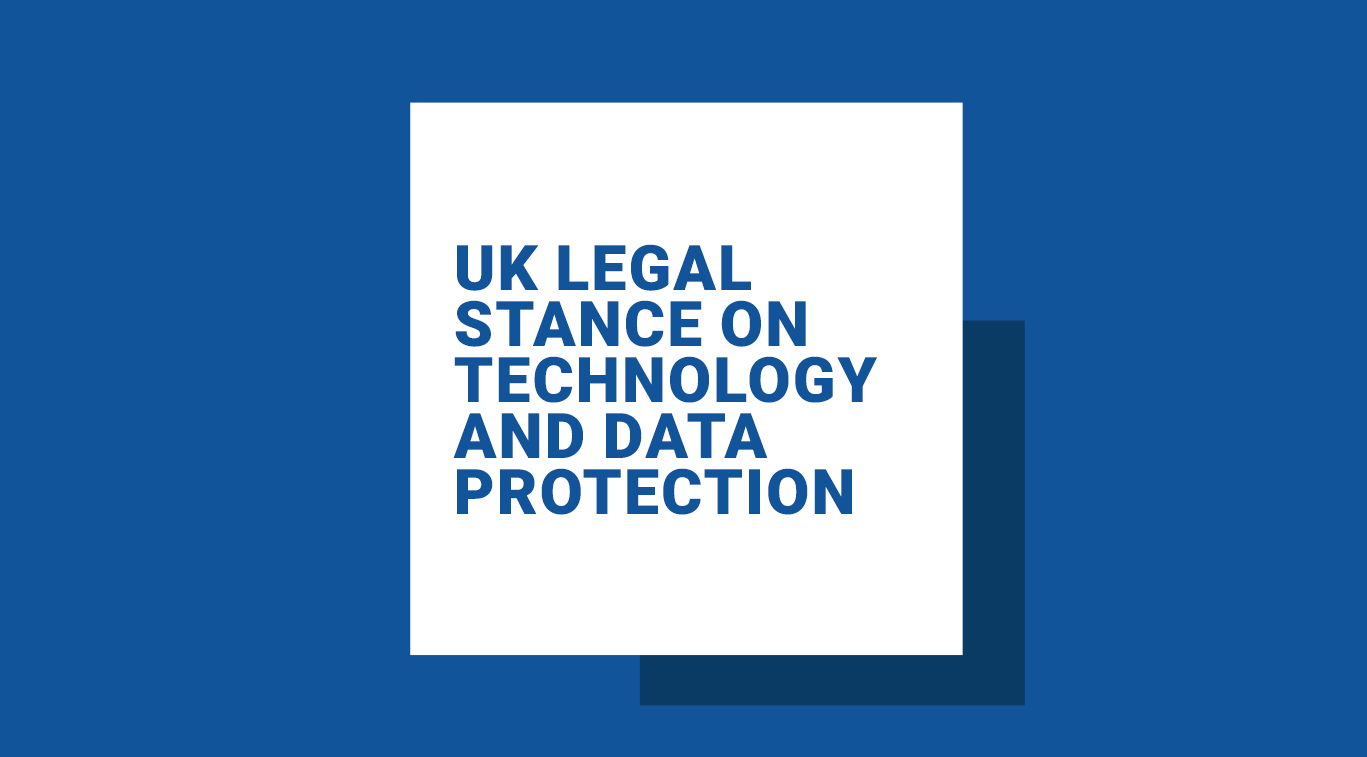UK Legal Stance on Technology and Data Protection

Written by Fatima Freifer
Blogger

Introduction
Data privacy has become a hot topic once again as digital implementation of smart technologies such as AI are becoming more prevalent. After the Cambridge Analytica scandal and the GDPR rollout, people are becoming even more aware of how companies collect their data, how much they keep, and how they use it, including privacy and data security risks in cloud computing as well as data protection in cloud computing. [1] In the digital age of today, there are new ways to store information and transfer it from one party to another that were not available just a few decades ago. New technologies have opened up many new opportunities for businesses and individuals and changed lives for the better in many ways.
But with these advantages come potential disadvantages – namely, threats to privacy and security such as data privacy issues in cloud computing affecting individuals, organisations, corporations, governments, or virtually any other entity that collects sensitive personal data or confidential information such as in law firm databases. The adoption of new technologies can often result in the inadvertent disclosure of confidential information to third parties or an unauthorised insider – this is known as a data breach. [2] Companies must take measures to protect personal information stored in their systems or databases against accidental or malicious access by employees or third parties.
What is a Data Breach?
A data breach is any event that poses a risk of disruption or loss of data or where access to or use of data is not authorised by the owner. A breach can occur either through malicious intent, a systems error or through the loss of an unencrypted device or media that has been used to store data. [3] Data breaches can impact any entity including cloud computing and data protection, and companies, no matter how large or small, and can have serious implications, including financial and reputational damage. Data breaches occur when personal data is accessed, stolen or lost by an unauthorised party as a result of human error or malicious activity, such as hacking. Any organisation that collects and stores sensitive customer data, such as credit card numbers, health records, bank account information, name and address, must take steps to protect that information from loss or misuse. [4]
Importance of Data Protection
The GDPR, which came into force on 25 May 2018, affords data subjects greater rights around the control of their personal data, including the right to be forgotten (also known as data erasure or right to be forgotten). Not only will data subjects be able to request that their data be erased from legal client database software or law firm database software, or corrected if it is inaccurate, but also that it be deleted completely where there is no lawful reason for its retention. [5] This shift in the balance of rights and obligations has significant implications for companies that handle the data of EU citizens, regardless of the size or sector of their business. For organisations, compliance with data protection regulations is essential in order to protect their reputation, maintain customer trust and avoid hefty fines. Beyond the financial implications, non-compliance can also severely damage an organisation’s relationships with customers and affect its ability to conduct business. [6]
UK Legislation and Regulation on Data Protection
The implementation of the GDPR on 25 May 2018 has strengthened the rights of EU citizens regarding data protection. The GDPR is directly applicable in the UK as a member state, so there is no need for UK businesses to enact new legislation. [7] Although the GDPR is directly applicable in the UK, the government has passed an Act known as the Data Protection Bill to provide businesses with a helpful checklist for compliance. The Data Protection Act 2018 is based on the principles of the GDPR, as well as the Information Commissioner’s guidance on how organisations should comply. The GDPR and Data Protection Act seek to protect personal data against unauthorised access and sharing, as well as increasing transparency around the use of data. GDPR applies to organisations that operate in the EU, regardless of where they are based. Businesses must notify the ICO of any data breach that poses a risk of harm to data subjects without undue delay and within 72 hours of becoming aware of the breach. [8] Organisations must also register with the ICO, as well as appoint a Data Protection Officer (DPO) if they handle large amounts of sensitive data or are expected to come into contact with EU citizens’ data.
Data Protection in the Legal Sector
Legal professionals have a duty of care to their clients, as well as to their employees, to ensure that all data is adequately protected. When dealing with sensitive data, such as client information, it is important to understand the GDPR’s requirements for protecting that information in order to avoid a data breach. Legal software pricing and document management software prices are competitive for businesses, so investing in a secure system is imperative.
As part of the GDPR, EU citizens can request that businesses delete their data, even if that data was collected with valid consent. Legal professionals should be aware of this right and take steps to ensure that data is not only secured, but that it is also easy to retrieve in case it is needed again. [9]
Conclusion
The legal stance on technology and data protection is ever-evolving as new technologies are developed and businesses adopt innovative ways of working. [10] The use of technology in the legal sector is not a new phenomenon, but its application has evolved over time to meet the needs of businesses and their clients. In order to ensure that data is protected both during storage and when it is being processed, law firms are turning to innovative technologies such as big data analytics and artificial intelligence. As these technologies become more commonplace, it will be interesting to see how they continue to shape the legal landscape.
References
[1] Data Protection Act 2018, UK Public General Acts https://www.legislation.gov.uk/ukpga/2018/12/contents/enacted
[2] Guide to the UK General Data Protection Regulation, https://ico.org.uk/for-organisations/guide-to-data-protection/guide-to-the-general-data-protection-regulation-gdpr/
[3] The Main Challenges UK Law Firms Can Expect In 2022, Fatima Freifer https://goodlawsoftware.co.uk/the-main-challenges-uk-law-firms-can-expect-in-2022
[5] International Business Contracts: UK Sales Law and CISG, Fatima Freifer https://goodlawsoftware.co.uk/international-business-contracts-uk-sales-law-and-cisg
[6] Technology’s role in data protection – the missing link in GDPR transformation https://www.pwc.co.uk/services/legal/insights/technologys-role-in-data-protection-the-missing-link-in-gdpr-transformation.html
[7] The Metaverse and UK Legislation, Fatima Freifer https://goodlawsoftware.co.uk/the-metaverse-and-uk-legislation
[8] Data protection by design and default https://ico.org.uk/for-organisations/guide-to-data-protection/guide-to-the-general-data-protection-regulation-gdpr/accountability-and-governance/data-protection-by-design-and-default/
[9] The Privacy, Data Protection and Cybersecurity Law Review: United Kingdom, William RM Long, Francesca Blythe and Denise Kara, Sidley Austin LLP, 05 November 2021 https://thelawreviews.co.uk/title/the-privacy-data-protection-and-cybersecurity-law-review/united-kingdom
[10] Lawyers say changes to UK data law will make life harder for international businesses, Lindsay Clark, 16 May 2022 https://www.theregister.com/2022/05/16/brexit_data_law/








